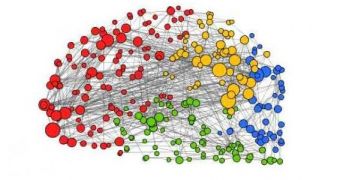Taking complex systems such as the Internet and social networks as examples, a group of experts at the University of Cambridge was able to create a mathematical model of the brain. Though simple, their tool provides a surprisingly complete statistical account of how different regions interact.
This is one of the most important goals in neuroscience. Numerous diseases are produced when various areas of the brain interact excessively, or poorly. It's only after understanding which of these connections are to blame that scientists can hope to develop new therapies against these disorders.
The simplicity of the model is mind-boggling. Experts took into account just two competing factors. The first was the distance between various areas of the brain, which determines the energy costs of maintaining a long-distance link.
The second one was the affinity that each section of the brain had towards communicating with other areas that have similar data input pathways. This approach turned out to be surprisingly encompassing.

 14 DAY TRIAL //
14 DAY TRIAL //